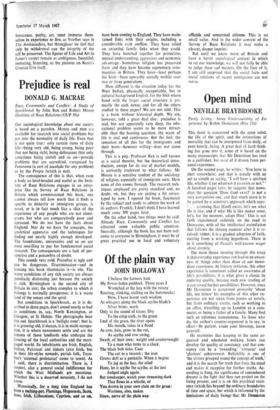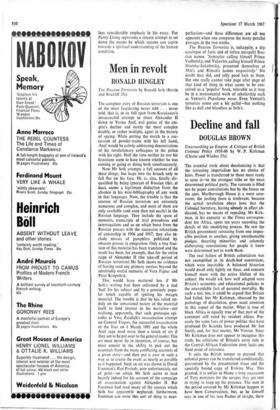Open mind
NEVILLE BRAY BROOKE
This book is concerned with the open mind, the life of the spirit, and the intimations of
mortality that can be interpreted from daily, or even hourly, living. A great deal of hard think- ing has gone into it, some of it based on the
many manuscripts that Mr Denniston has read as a publisher, but most of it drawn from per- sonal experience.
On the second page, he writes: 'You have to start somewhere; and that is usually with an
act as simple as saying, "I will have a spiritual
life, whether it (or whatever it is) exists or not."' A hundred pages later, he suggests that nowa-
days the question 'Does God exist?' is not a very compulsive one, and that much more is to be gained by a scientist's approach which says: . . assuming that [God] exists, let's see what He is like, and if what He is like makes sense, let's, for the moment. adopt Him.' This is not faith experienced suddenly on the road to Damascus, with all the intellectual assimilation that follows the shining moment after it is re- ceived; rather, it is a gradual adoption of faith, starting from a working hypothesis. There is in it something of Pascal's well-known wager about eternity.
The main theme running through this essay is that everyday experience can lead to an aware- ness of things other than those of our imme- diate experience. In literary criticism, this other experience is sometimes called an awareness of life's possibilities; it is what gives a classic its enduring quality, because each new reading of it can reveal further possibilities. However, since Mr Denniston is concerned primarily' 'about life, not letters' his examples of this other ex- perience are not taken from poems or novels, but from ordinary events, such as working in an office, travelling up to London as a com- muter, or being a father of a family. Many find such an existence monotonous. To those who do, the author's counter-argument is to say, in effect—Be patient, count your blessings, know yourself.
He maintains that keeping to the same or- ganised and scheduled working hours can develop the quality of constancy, and that con- stancy can be a 'rewarding,' virtuous' and 'glorious' achievement. Reliability is one of 'the virtues grouped round the concept of truth,' and it is the search for truth that frees the mind and makes it receptive for further truths. Ac- cording to lung, the significance of remembered dreams is the light that they can project on the living present, and it is on this psychical exist- ence (which lies beyond the ordinary boundaries of time and space, but which is informed by the limitations of daily living) that Mr Denniston
lays considerable emphasis in his essay. For Partly Living represents a sincere attempt to set down the means by which anyone can aspire towards a spiritual understanding of the human condition.































 Previous page
Previous page